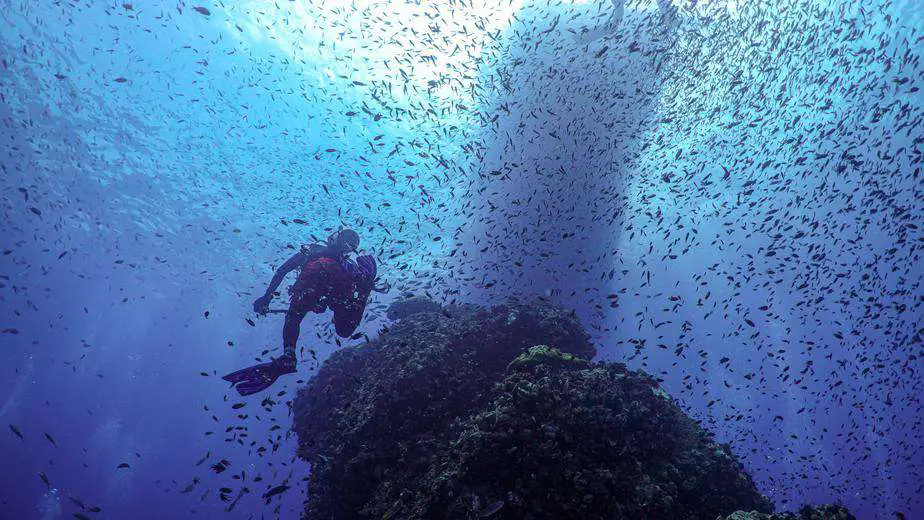Everyone’s view on scuba diving is different. For some, scuba diving is a relaxing and fun activity to do while vacationing at a tropical paradise. Others find it boring. Unfortunately, some people think scuba diving is scary because they have a fear of drowning, sharks, the depths, claustrophobia, thalassophobia, and many other concerns that range from irrational to legitimate.
Yes, scuba diving can be scary when you’re first starting out. It’s natural to fear what you don’t know. However, this fear is normal. Once you get a few dives under your belt, you’ll find that most of the fears were unfounded or unlikely to happen as long as you follow safe diving procedures. Instead, your fears will slowly be replaced by more positive emotions as you observe the unique marine life, beautiful underwater vistas, and experience the feeling of weightlessness like you’re floating in space.
It’s completely normal to feel nervous or scared if you have no experience with diving or even swimming. After all, we’re land dwelling creatures and we like to breathe air. However, many people find that taking a scuba diving course and learning safe diving procedures have helped them put their fears to rest. As long as you have a positive attitude and determination, there’s no reason why you can’t overcome your fears. This article will discuss common scuba diving fears and how you can beat them.
Common scuba diving fears (and why they aren’t as scary as you think)
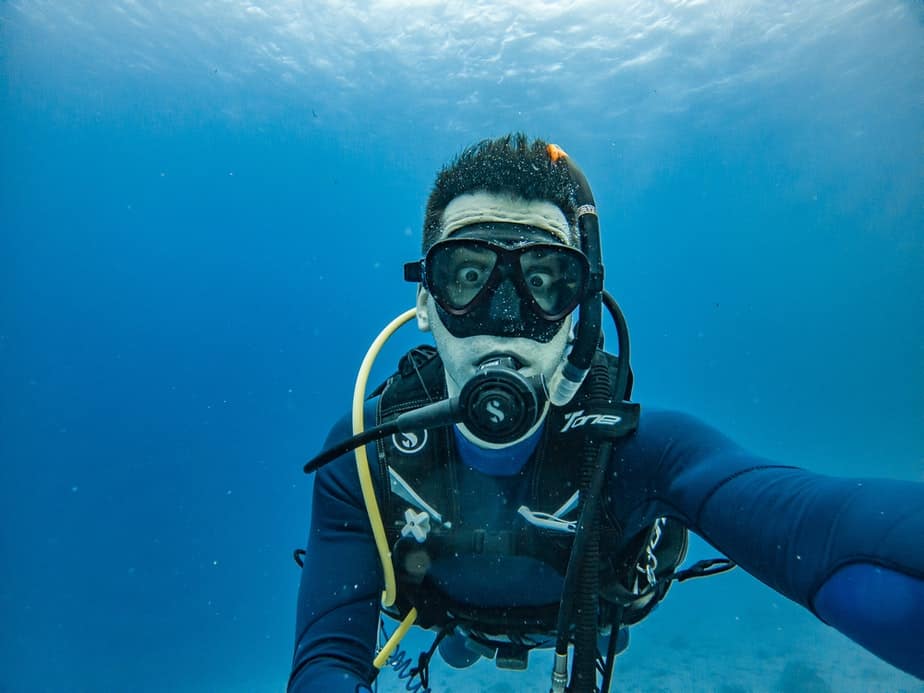
Most fears are unfounded. Generally, the more knowledge and experience you have on a certain topic or activity, the less intimidating it will be. The same is true of scuba diving. Most fears are either because of a lack of understanding (which is easy to address), or a more personal fear such as a fear of water or of the depths (more difficult to deal with, but still doable).
Everybody is different, and thus everybody has a different outlook on scuba diving. What may seem scary to one person might seem fun and exciting to another. We can say right off the bat that fears that stem from a lack of understanding should not be much of a concern.
As soon as you take the Open Water Diver course (the entry level diving course offered by PADI) and become a certified diver, I bet 90% of your fears will be alleviated because you’ll learn about them and how to address them during the course.
The OW Diver course teaches you essential safety skills that you should follow to the letter. You’ll have time to practice using equipment and doing the techniques in a shallow pool until you’re confident. It’s not like they just chuck you into the ocean and expect you to swim or sink; there is a gradual and proven process that will equip all divers to be safe divers.
Fear of asphyxiation
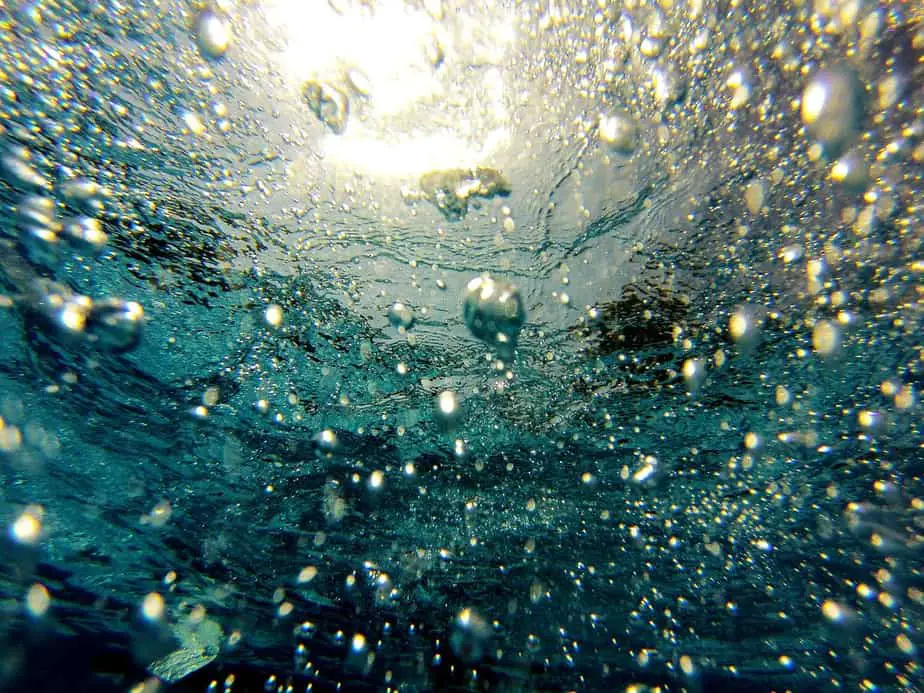
Since humans don’t have gills and can’t breath underwater, it’s natural that the first thoughts in a beginner’s mind about scuba diving are most likely: what happens if I run out of air and how likely am I to drown?
For starters, a standard 80 cu ft (207 bar) aluminum tank or a 100 cu ft (232 bar) steel tank can provide about 30-45 minutes of air assuming you are a recreational open water diver. This range can vary depending on dive depth and how much you exert yourself during the dive. You can know exactly how much air is remaining by looking at your pressure gauge.
Obviously, if you run out of air a hundred feet underwater, then your time on earth is also soon to run out if you’re not prepared. But since you are prepared you’ll have a backup air source or a dive buddy that can share their air with you.
Scuba regulators should come with a spare regulator called an alternate air source, or octopus, and that is for another person to breathe from in an emergency. There’s a reason why divers are recommended to dive as a group, and if you want to dive alone, then you’d better have a lot of redundancies.
Going back to the air gauge, you need to check it frequently, especially as you dive deeper. As the water pressure increases, the air volume decreases which means it gets used up faster. For this reason, we don’t recommend using elapsed time as a measure of how much air is left – a pressure gauge will give you the most accurate reading.
Another factor that isn’t always considered is the difference in air consumption rate between men and women. Men, being on average larger than women, consume more air than women. Of course this isn’t always true in reality because there are other factors to consider, but this will be true in more cases than not. Going with this logic, a larger male would run out of air faster than a smaller male, and so on.
Next, a good practice to do is to do occasional check-ups with your dive buddy to get an idea of how much air is remaining between the both of you. This helps you know the best time to end a dive. You always want to save some air for the ascent. Don’t wait until the last minute; it’s your life that you’re gambling with.
Most of the time when divers run out of air, it is because divers get so focused on exploring and observing that they forget they are actually on a time limit. Sometimes divers underestimate how much air is needed for the ascent. When they run out, they panic and rapidly ascend to the surface without doing a safety stop.
One of the most common ways for a fatality to occur is through decompression sickness caused by a rapid ascent. Thus, if you have a healthy fear of running out of air, then hopefully you will dive more conservatively and then you won’t ever have an issue with running out of air.
To ensure you will have more conservative dives, you can set your dive computer’s decompression algorithm to be more conservative. This may cause your dives to end somewhat prematurely, but at least you’ll never have to be scared of running out of air again.
Fear of struggling to breathe
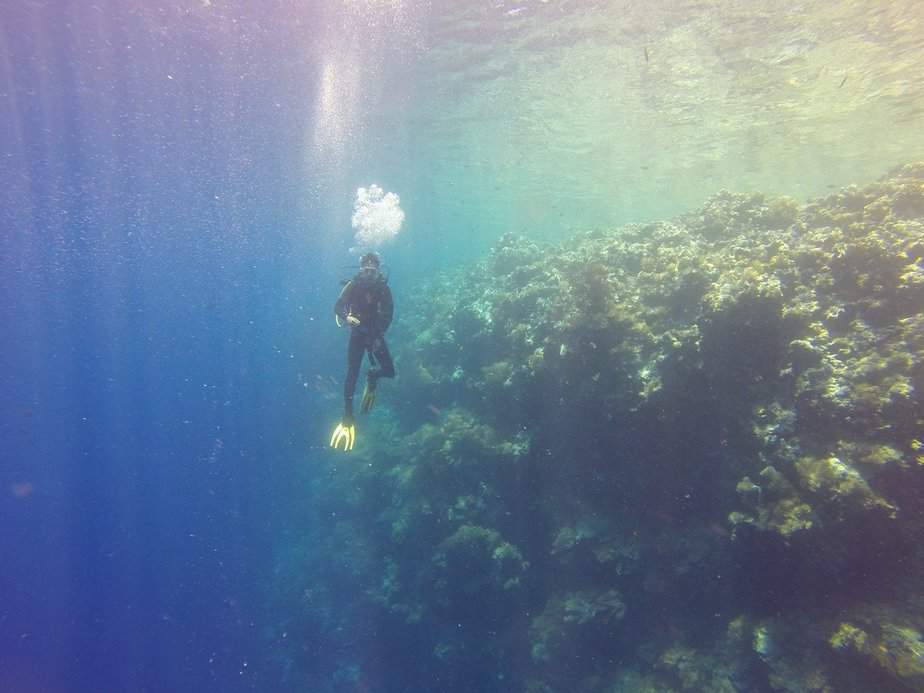
First of all, if you have asthma, you need to be medically cleared by a doctor if you want to scuba dive. Modern scuba regulators are designed to be easy to breathe with, however no one can guarantee if there won’t be any issues that could be exacerbated with asthma.
Additionally, if you have a cold, it’s possible that the increased mucus production and congested sinuses make it difficult to breathe, further exacerbating the problem.
The mouthpiece that you actually breathe from when using a scuba regulator is called the demand valve. It’s called that because when you demand air by inhaling, the regulator should provide you air commensurate with how much you breathed in. It should not be hard to breathe using a regulator compared to, say, breathing through a snorkel which can be more difficult than normal breathing.
When breathing underwater, it is recommended that you take long and deep breaths. If you exhale too quickly, then not all of the oxygen will have been extracted by the lungs and there will be wastage. Rapid breathing will cause your air consumption rate to skyrocket, and this decreases your bottom time.
Since a standard scuba regulator has an open-circuit design instead of a closed-circuit design, what this means is that exhaled air is vented out into the water. There will be many bubbles and it will be somewhat noisy. However, once you’ve gotten used to the air and how noisy it is to exhale, then you’ll find breathing with a scuba regulator to be as normal as regulator breathing. Nothing scary about it.
Fear of regulator malfunction
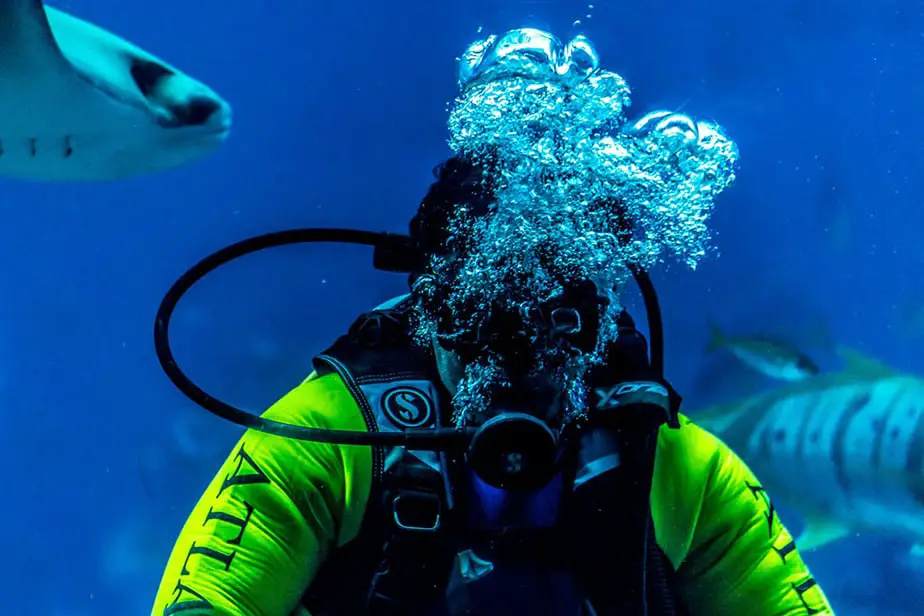
So now you know how a regulator helps you breathe underwater, however a new question arises: what happens if the regulator breaks?
A scuba regulator has many key components. You don’t necessarily need to know how they work, but what you do need to know is that the regulator is designed to stick open if it malfunctions, causing air to flow out.
The reason for this design is so that you can at least still get air instead of suddenly being cut off from your supply. However, the problem is that a free-flowing regulator is leaking air quickly, and the fear of it happening is a diver’s worst nightmare.
In the Open Water Diver course, your instructor should have covered what to do in the rare event that this happens. A scuba instructor will teach you what to do with a free-flowing regulator better than we ever will, so you can just take the course and get the nitty-gritty details first-hand. It’ll seem complicated at first, but by the end of the course, you’ll know how to manage it comfortably or else you won’t pass.
Also remember that you’re not alone. Signal to your dive buddy that something is wrong with your regulator and you need to share air. They should have an octopus (alternate air source) for you to breathe from and you can make the ascent together.
If you have a strong fear of running out of air or the regulator malfunctioning, then always dive with a buddy and/or a backup air source!
Fear of equipment malfunction/loss
We might as well get this general point out there. Yes, regulator or tank valve malfunctions are probably the scariest. However, that doesn’t mean that a dive computer or BCD malfunction is any less scary. Honestly, we could probably write an individual section for each piece of scuba equipment malfunction and it’d be terrifying to read about if you’re scared of it happening.
Thankfully, equipment malfunctions can be mitigated somewhat by bringing backups of all the most important pieces of gear. That includes things like a backup dive computer, dive mask, SPG, and so on. As mentioned, the regulator comes with an alternate second stage called the octopus, and you can even use your partner’s so thank goodness for that.
That said, even something as basic as losing your dive mask because you left it on your forehead while waiting for the boat to pick you up can be terrifying for… different reasons. A dive mask is probably one of the easiest pieces of scuba equipment to replace. You should always be diving with a backup one as well. The scary part is when you lose an expensive pair of prescription lenses and the lenses on your backup dive mask is not vision correcting, you’ll be terrified of the massive waste of money and lack of enjoyment you’re about to experience.
Fear of choking on water
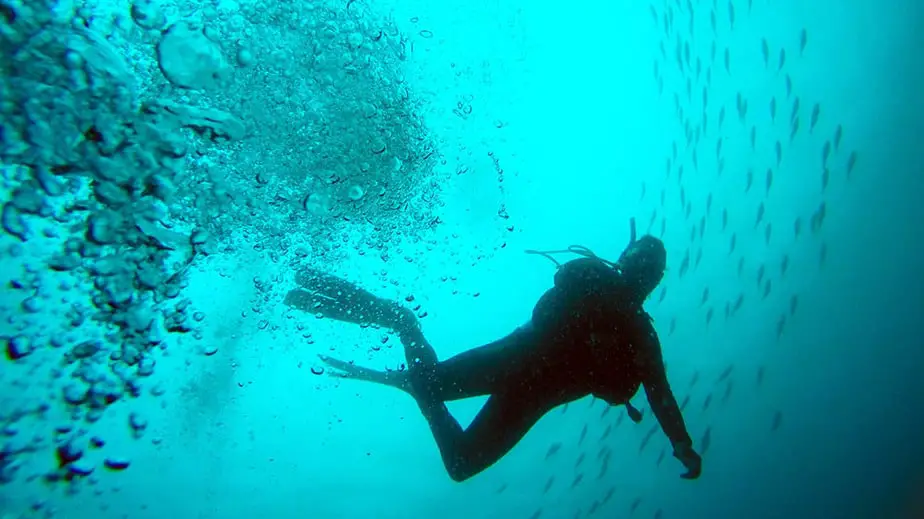
Perhaps you are afraid of water unexpectedly entering your nose or your mouth. First, you almost never need to worry about water entering your mouth because your regulator mouthpiece is in the way.
This is not a snorkel, water won’t suddenly flood in because you’re submerged. Even if some water somehow enters your mouth, one of the first skills taught is how to push it back out through the regulator. Choking or swallowing the water is not a concern.
Second, can water seep into the mask and get into your nose and eyes? Yes, water can sometimes enter a dive mask. However, even if it does, the process should be so gradual that you’ll notice it long before you choke on it.
Water entering your mask is a sign that the mask seal is not completely watertight. If you have a beard or mustache, then it can prevent the mask from sealing to your face. There are some ways that you can seal your scuba mask over your facial hair, however they aren’t as fool-proof as simply shaving it off. You can still give it a try though.
If your mask fogs up, then you need to know how to clear your mask. This involves voluntarily breaking the mask seal and letting some water flood in, enough to rinse the fog off the lenses. So as not to choke on the water and to get the water out of your mask, you just need to forcefully exhale through your nose to clear the mask of water.
Mask clearing is another essential skill that you’ll learn and practice during the Open Water Diver course. If you’re not confident, you can practice it in a shallow pool until you’re comfortable. The concept is the same no matter what the depth.
Fear of sharks (or other large marine animals)
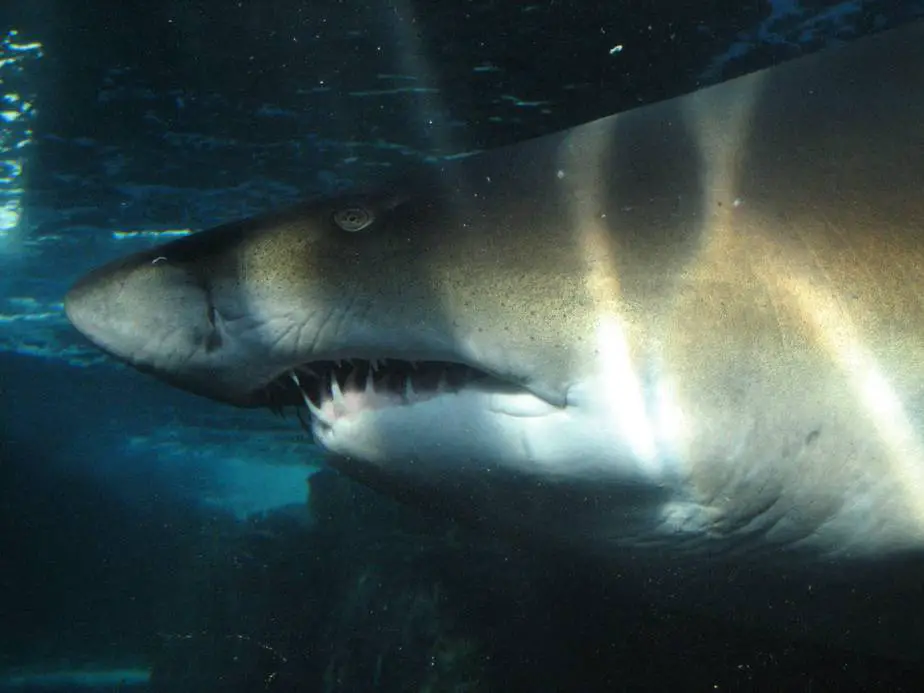
Ever since Jaws came out in 1975, sharks have been demonized as bloodthirsty killing machines. How could scuba divers be so brave as to dive in waters that sharks inhabit? Do divers have some kind of death wish?
While there is some truth to the notion that sharks are fearsome killing machines, they tend to leave humans alone. We are not part of a shark’s regular diet; if a shark swims up to you, it doesn’t necessarily mean it’s going for the killing blow.
Other than sharks, there are also octopuses, eels, manta rays, and maybe even whales that some divers find unpleasant. These creatures are typically harmless if you leave them alone. In the same way that most people don’t find horses to be dangerous, these animals will keep to themselves unless provoked.
Unfortunately, the media loves to sensationalize marine creatures. They make them larger, more vicious, and predatory even though they tend to leave humans alone in reality. If you have such a paralyzing fear of marine life, to the point that it’s a full-on phobia, then you may need professional help that this article cannot provide.
However, for fears that are not quite the level of a phobia, then perhaps you can try to use logic and reason to quell your fears. Do a search on the actual number of shark attacks. You’ll find that most cases occur to people who do board sports. The overall risk of being bitten by a shark remains extremely low.
If you’re okay with the risk of driving a car or flying on an airplane even though there are some legitimate risks associated with that, then why not accept the fact that there is little risk of marine life attacking you unprovoked?
Claustrophobia, thalassophobia, and any other phobias
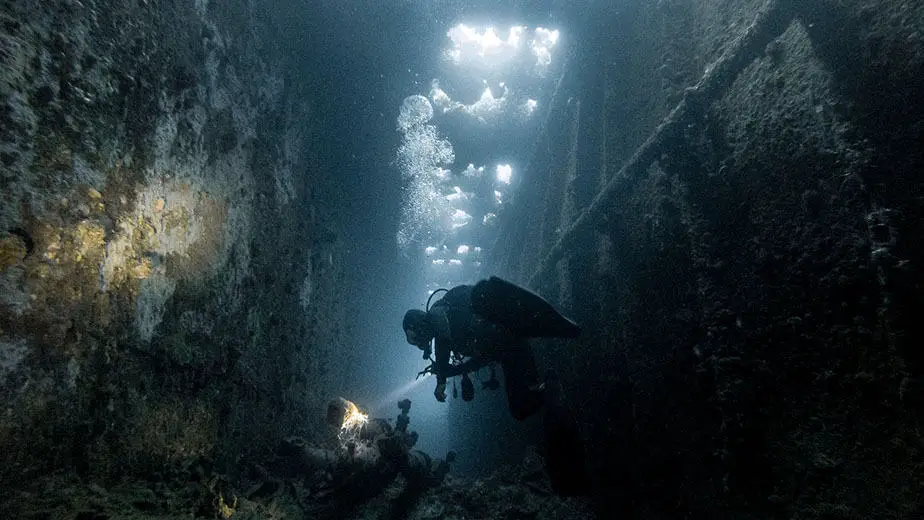
The two most problematic phobias for scuba divers are claustrophobia and thalassophobia. Claustrophobia is the fear of confined spaces, and even though the ocean is a vast and open space, the water pressure squeezing down on you as well as masks without side windows can make you feel like you’re trapped.
Next, thalassophobia is the fear of the ocean or large bodies of water. The anxiety can be triggered by seeing how deep and vast the ocean is, the kinds of sea creatures that reside in the water, or even a general fear of water itself, including small bodies of water.
Unfortunately when it comes to phobias, it’s not so easy to fix using rational thinking because the fear itself is irrational. If this feeling is too severe, you may need to seek professional help.
We are not medical professionals and you take the following advice at your own risk. There are some baby steps you can take to overcome your fear. The first thing you should do is find a shallow pool of water that you can easily surface from by standing up. Here is where you’re going to conquer your claustrophobia and thalassophobia.
Put on your dive mask and calm your mind by taking slow and deep breaths. Slowly submerge your face underwater knowing you have an easy way out if the fear is too much. You are safe. The key here is to slowly introduce yourself to situations that would normally cause you to panic in a safe, confined environment.
The constant exposure to your phobia in an attempt to overcome it is known as systematic desensitization. Once you realize that a situation that you feared is, in fact, completely safe, then maybe your mind will eventually make that connection that it shouldn’t be scared.
However, if you feel that your phobias are getting the best of you, it’s best to end your attempt while you’re still calm. This is true of an actual dive as well – end it before you enter a full-on panic attack.
Hopefully over time you will desensitize yourself to your phobia and be able to dive normally. One thing to note – there are dive masks with side windows to give you an almost 180 degree view in front of you. This helps not only with visibility but may alleviate the feeling of claustrophobia.
Why scuba diving is a safe sport
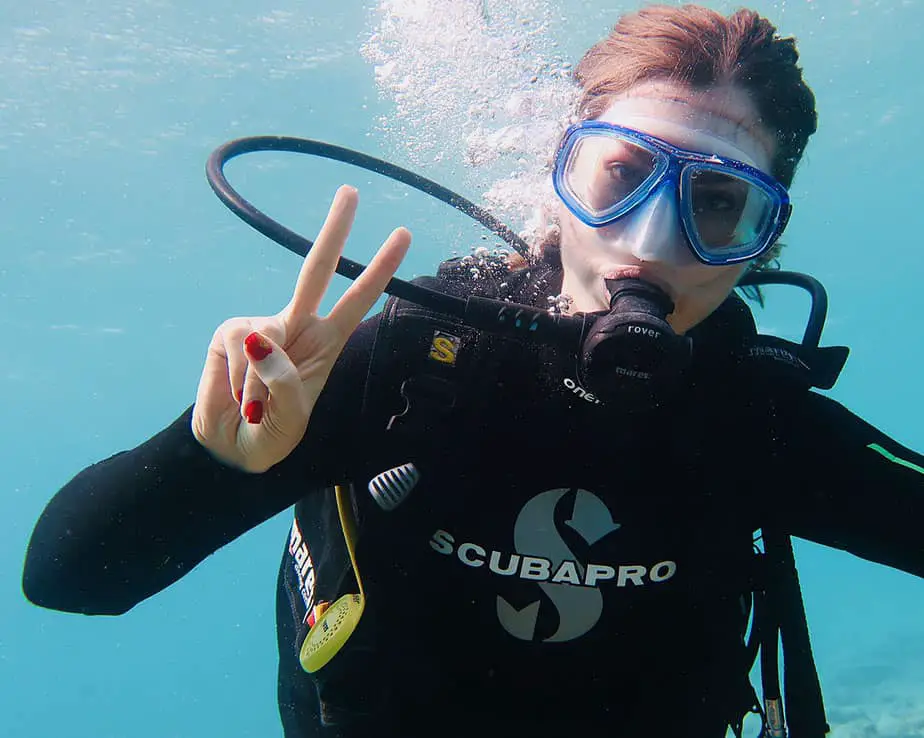
There are many good reasons why someone might be scared of scuba diving, and we can boil them down to two main concerns: fear of injury and fear of death. These are very legitimate concerns, so the purpose of this section is to prove that scuba diving is not a dangerous sport.
Once you understand that you’re unlikely to get injured (and even if you do, it usually does not warrant a hospital visit) or die on any given scuba dive, then hopefully your fears can be alleviated some. The next section details why most scuba diving fears are unfounded.
Common injuries and how to easily avoid them
The most common scuba diving injuries are pressure-related or superficial injuries. Let’s discuss the superficial injuries first since they are more straightforward to understand and less life-threatening in the grand scheme of things.
Superficial injuries
Sometimes divers who are not careful can collide with rocks or coral. Your neoprene wetsuit or fins may offer some protection against injury, however sharp rocks and coral can puncture through the material and reach the skin. There’s also a risk of sharp or pointy surfaces when you’re wreck diving. In very rare circumstances, you may get injured by wildlife if you don’t keep your distance.
Some common injuries that can occur at the surface are hurting your back by improperly carrying your scuba gear, flubbing your entry dive and landing with your face/stomach instead of your back or legs, getting sunburnt, experiencing seasickness, and not drinking enough water resulting in dehydration.
These issues are all easily avoided by having more situational awareness. Wear sunscreen, hydrate frequently, keep a safe distance from coral and marine life, stick with your dive buddy; essentially the solution is to follow safe diving practices and to err on the side of caution.
Pressure injuries
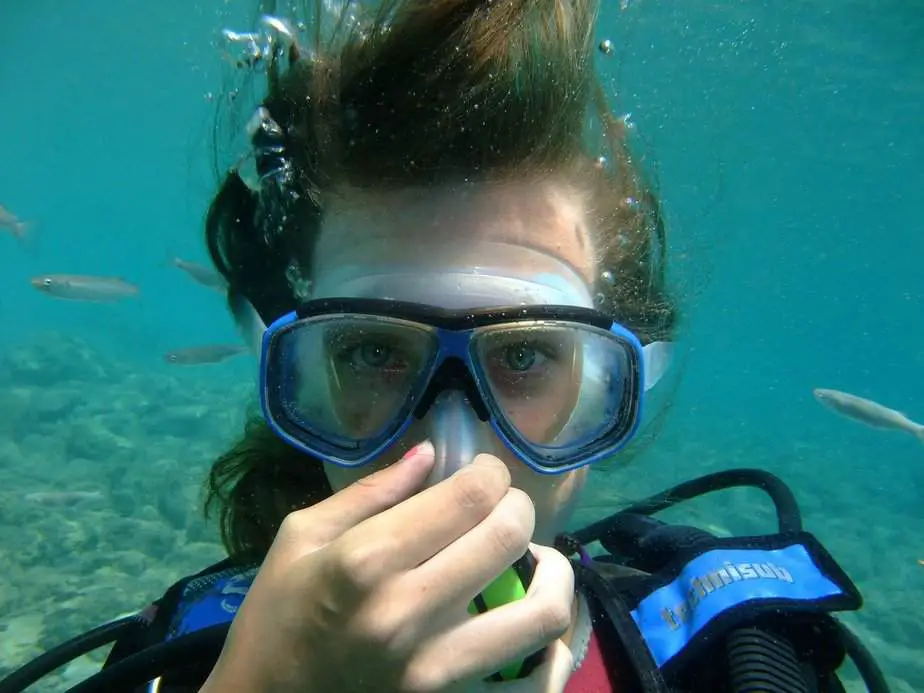
The injuries described in this section are the more dangerous, but still easily avoidable. Pressure injuries are a risk that scuba divers have to be wary of. We can categorize them into barotrauma, decompression sickness, and nitrogen narcosis.
Barotrauma occurs when the air-filled spaces of your body (i.e. ears, sinuses, mask, lungs) can’t equalize and get damaged as a result. As you dive deeper, the water pressure increases as the volume of air in the body decreases. If you don’t equalize, the pressure will be so great that your eardrums can burst, your mask can damage your eyes, and your lungs can rupture.
All you need to equalize is to constantly breathe. Never hold your breath when scuba diving or else you’ll rupture your lungs. Occasionally exhale through your nose to equalize the mask pressure. Pinch your nose through the mask’s nose pocket and exhale gently to equalize your ears and sinuses. Long before any body parts rupture, you will feel mounting pressure that can eventually result in pain, so it’s very obvious when you need to equalize. The motto is to equalize early and often, long before pain is felt.
Next, decompression sickness, also known as “the bends”, can occur when a diver ascends too quickly. Divers breathe compressed air with nitrogen in it. Due to the water pressure, the nitrogen can enter our body’s tissues. During the ascent, the excess nitrogen is released. If the ascent is too quick, the nitrogen can form bubbles in the body that can lead to nerve and tissue damage, as well as paralysis or death if the bubbles reach the spinal cord or brain.
To prevent decompression sickness, treat all dives as decompression dives. Perform a 3-minute safety stop 3-5 m from the surface to give your body time to decompress. Ascend slowly according to what your dive computer tells you. Don’t go on an airplane too soon after scuba diving.
Lastly, nitrogen narcosis is a sensation very similar to diving while drunk. It occurs more frequently on deep dives where so much nitrogen has accumulated in the brain, causing confusion.
Nitrogen narcosis might cause you to make poor decisions that can cause injury or death in extreme cases. If you don’t dive more than 100 feet (30 m) then you don’t really need to worry about it. Divers can prevent narcosis by diving trimix, which is a type of technical diving. Nitrogen narcosis will go away on its own as you ascend and it leaves no lasting effects.
Scuba diving injuries compared to other sports
So, despite writing several paragraphs detailing common diving injuries, do we still stand by the statement that scuba diving is a safe sport? Yes. These potential injuries are unlikely to happen if you follow the rules and use common sense. It’s like driving – you’re in a metal death box going 80 mph on the freeway and one wrong swerve can cause a mass casualty event. If driving can still be considered “safe”, then so can scuba diving.
Don’t just take our word for it. According to the DAN Annual Diving Report 2012-2015 Edition, which reported 2010-2013 data on diving fatalities, injuries, and incidents in the United States. In that 4 year period, there were a total of 4,368 ER admissions. Of this number, 3,672 patients were treated and released or released without treatment. Only 77 ended in a fatality.
We can average the numbers out to 1,092 ER admissions per year and about 19 fatalities a year from scuba diving in the United States. This makes scuba diving one of the safest sports you can participate in.
Why you are unlikely to die while diving
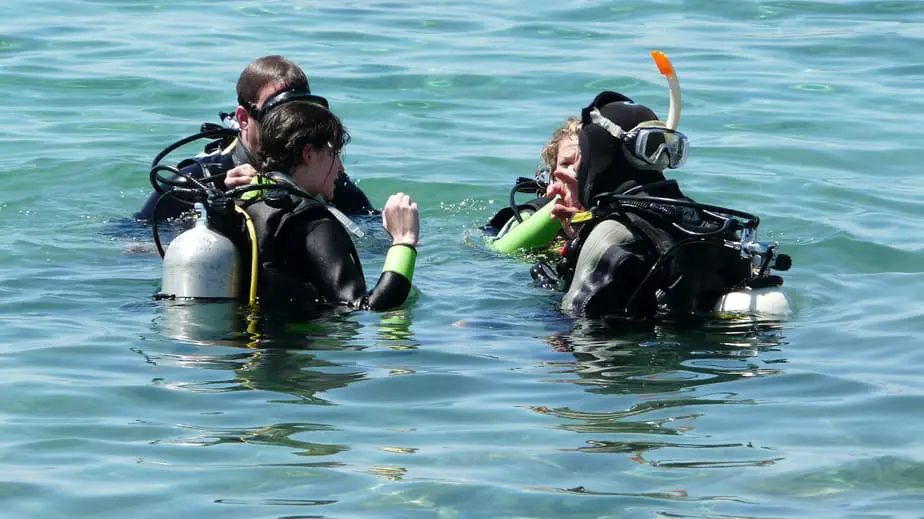
You’re more likely to die on the car or plane ride to the dive site than from scuba diving itself. We can attribute scuba diving’s low fatality rate to its many safety procedures in place to ensure that divers remain safe.
Even before you’re allowed to dive, you have to fill out a medical form. Depending on what you filled out, you may be required to get medical clearance from a doctor before you can dive. If you have a condition that makes it risky for you to dive, then you probably won’t be allowed to dive.
Then, there are the procedures you are expected to follow during the dive. The divemaster or instructor will give a dive briefing so you know about entry/exit points and things to look out for during the dive. You are also expected to dive with a dive buddy so that you can watch each other’s backs. Communication is vital here – you want to do frequent check-ups and keep an eye out for dangers or signs of distress.
To be honest, all of these safety procedures may even prove to be annoying for some divers. However, the fruits of its labor is that scuba diving has a mortality rate that is categorized as “relatively low” according to this study.
Specifically, the numbers are: 1.8 deaths per million scuba dives from 2006-2015 in the USA, which comes out to 658 deaths over 306 million dives over this 10-year time period. Mathematically speaking, you have on average a 1 in 465,000 chance of dying per dive, which is extremely low despite being an extreme sport.
This is even factoring the deaths from divers who were doing more technical types of diving. Only 563 deaths were from recreational diving, so if that’s all you’re counting, then you have a 1 in 540,000 chance of dying during a scuba dive. Those odds shouldn’t scare you, and in fact, hopefully they give you some much-needed relief.
Contributing factors
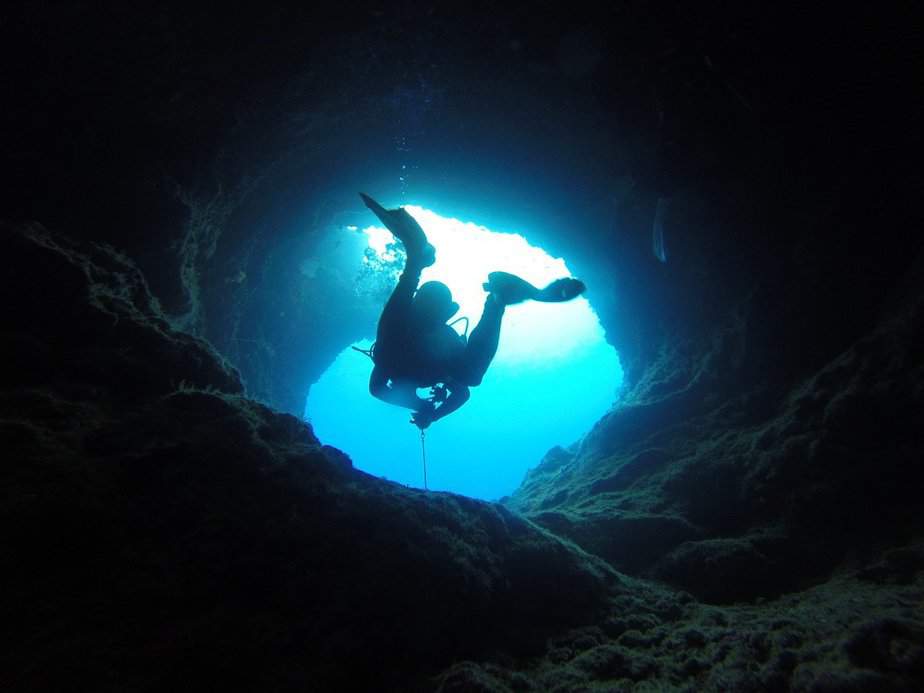
According to a workshop held by the Divers Alert Network (DAN) in 2011 about recreational diving fatalities and how to reduce them, they came to the conclusion that:
“The most frequently cited root cause among the independent population samples was insufficient gas or running out of gas. Other common factors included entrapment or entanglement, buoyancy control, equipment misuse or problems and rough water. Emergency ascent was also common. The principal injuries or causes of death included drowning or asphyxia due to inhalation of water, air embolism and cardiac events. Older divers were at greater risk of cardiac events, with men at higher risk than women, although the risks were equal at age 65.”
We can put most of these issues into two broad categories: deaths due to lack of experience, and deaths due to medical conditions.
Divers who are less experienced or more likely to panic when something goes wrong, or not know what to do in an emergency. For this reason, they should stick close to their buddy and group, pay attention to their pressure gauge, and err on the side of caution.
Additionally, older divers or divers with pre-existing medical conditions should get a health check-up at least once a year. Even if you were fine the year before, the older we get, the more likely new health issues may suddenly arise that didn’t exist before.
Even though statistically speaking, scuba diving is a low-risk activity, it is only due to the diligence of the divers that it is such a safe sport. There is nothing inherently safe about diving, and you are responsible for your own safety. As long as you stay vigilant, you are unlikely to become a victim yourself.
What other kinds of scary situations might a diver face?
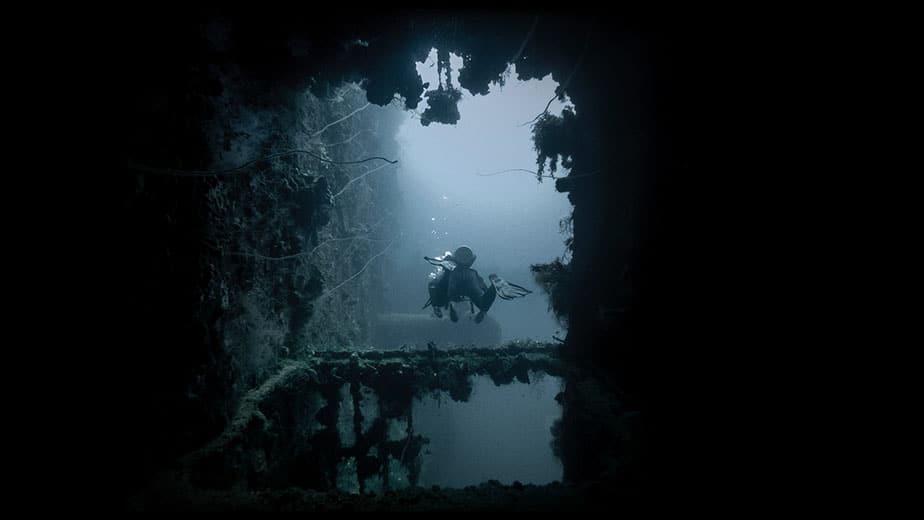
Other than the fear of sharks, claustrophobia, or running out of air, what could possibly be worse than this? If you think about it too hard, sure, there is the potential for all kinds of freak accidents while scuba diving. That doesn’t mean they are likely to happen.
However, one genuine nightmare scenario that can and has happened to divers is this. Imagine going wreck diving or cave diving (basically diving in an overhead environment where visibility is low). Then somehow, you kick up silt, or your dive light dies, or you get trapped, and visibility is low or you can’t find your way out.
Also, your dive buddy isn’t with you so nobody is coming to rescue you as you run low on air and can’t find a way out of your predicament. We’d imagine your final moments would be spent in absolute terror as you realize your fate is sealed. Does that sound terrifying? It could happen, and that’s why scuba diving is considered a dangerous and extreme sport depending on what type of dive it is.
However, why would this happen to you? If you’re just a recreational diver, you won’t ever dive to such depths or locations to get trapped in. Furthermore, even if you one day become a wreck or cave diver, you will receive extensive training to equip you for those circumstances. Plus, that’s the reason why you should dive with a buddy.
By taking deep breaths and remaining calm, you can tap into your training, experience, and thoughts on how to avoid or get out of a deadly situation. If you’re entangled, can you reach your dive knife and free yourself? Can you alert your dive buddy by making a noise or shining your light around? Can you reach your backup air source or trace your way back to the entrance?
There are many ways out of a situation so we can’t give any specific feedback. However, we can tell you with absolute certainty that if you panic then your chances of dying increases exponentially.
How to overcome your fear of scuba diving
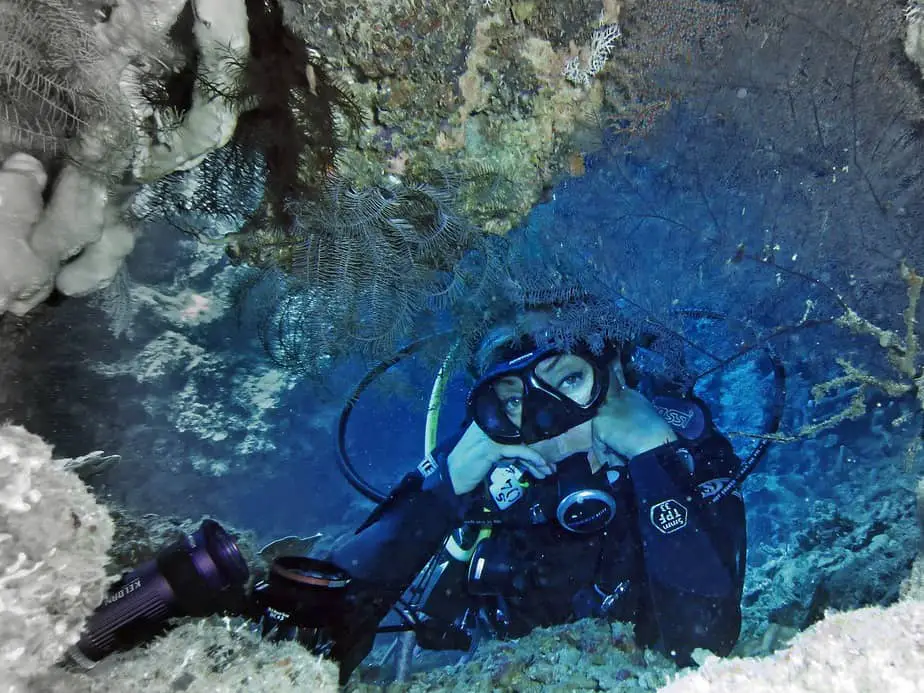
If your fear of scuba diving is not something that requires professional guidance to overcome, then we think the best way to beat your fears is to understand it and then face it head on. Knowledge is power, and fear comes from the unknown. What is a better first step then than to read up on scuba diving?
Of course, you can only learn so much by reading. Read first to get an idea of what to expect. However, the best way to learn and overcome is by doing. Maybe your first step is to get better at swimming if lack of confidence in your swimming ability is a major inhibitor for you.
You’ll also need a baseline level of swimming ability to be able to pass the Open Water Diver course, meaning you can’t even be a diver if you can’t swim well. Furthermore, the Open Water Diver course will also require you to do a medical check-up to determine if you’re fit to dive. So if you were worried about a medical condition you might have, then that’s that taken care of.
During the Open Water Diver course, your instructor will teach you dive theory and best practices. There will be a knowledge component, a pool component, and then an open water component to finish the course off. During each component, you will learn about the various problems that can arise during a dive and how to deal with it.
You are encouraged to ask questions so that difficult concepts can be clarified. During each step of the course, your instructor will supervise you and give you personal feedback on your progress. If you feel nervous at all, then let your instructor know so they can assist you better. By the time you finish the course and get certified, so many of your questions will be answered and that should do wonders for overcoming your fear.
If you feel like heading straight into a scuba diving course is too fast of a pace, then you can try out various introductory programs. We recommend the Discover Scuba Diving course from PADI which is basically like a one-day crash course on the basics of diving. However, you won’t get certified at the end like in the full Open Water Diver course.
Once you have a few dives under your belt, then that nervous feeling in your stuck will change from being due to nervousness to being due to excitement at the next diving adventure you get to go on. If your fear is more deep-rooted, then you may need therapy or some other form of assistance before you head into the water.

